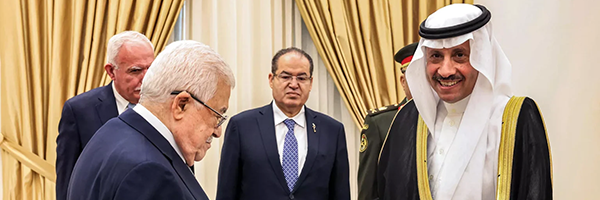Saudi Arabia is Trying to Pacify Palestinians While Opening the Gates of Normalization With Israel
 Rajab al-Madhun, Orinoco Tribune, October 1, 2023 —
Rajab al-Madhun, Orinoco Tribune, October 1, 2023 —
Just days after Saudi Crown Prince Mohammed bin Salman gave an interview about ongoing talks with Israel, it appears that the door to normalization is now wide open. At the same time that the Saudi Ambassador to the Palestinian Authority, Nayef al-Sudairi, arrived in the Palestinian territories to “reassure” the Palestinians about the Kingdom’s position on Palestinian rights and to visit the Al-Aqsa Mosque, announcements poured in about Israeli ministers and Knesset leaders visiting the Kingdom. It began with the arrival of the Israeli Minister of Tourism Haim Katz on September 26. This is the first public visit to the Kingdom of Saudi Arabia by an Israeli official of this level. Such two-way visits are proof of what the Saudi crown prince called “progress” in the normalization talks with the zionist entity. These talks are taking place within a trilateral framework involving the United States, and they are expected to produce new security arrangements between Washington and Riyadh.
In Ramallah, Riyadh faces the difficult task of trying to convince the Palestinians to accept mere promises from the zionist entity in exchange for the Palestinian Authority’s blessings for Saudi normalization. It is unrealistic to bet that the Israeli government will make so-called “concessions” that would allow the establishment of a Palestinian State. The Saudi ambassador sought to reassure the Palestinians of his country’s position before even discussing the possible borders of such a state. The ambassador and his official delegation arrived from Jordan via the King Hussein (Allenby) Bridge, which is supervised by the occupation, before arriving in Ramallah. It is noteworthy that this is al-Sudairi’s first visit since he was appointed as non-resident Ambassador to the Palestinian territories in August. It is also the first visit by an official Saudi delegation to the occupied Palestinian territories since the signing of the Oslo Agreement in 1993.
This visit comes in the context of Israeli and US discussions about how to progress regional normalization and increasing the chances of overcoming the obstacle of the Palestinian issue. They intend to receive the “blessings” of the Palestinian Authority in exchange for generous Saudi economic support.
Furthermore, Al-Akhbar newspaper learned from sources in the Palestinian Authority that the Saudi Ambassador will be “multi-tasking in the region.” His duties will not be limited to those specified by the Palestinian Authority, but he will have direct relations with the occupation government, through unannounced meetings with Israeli officials, as a first step to build official relations between the two parties.
According to local sources, the Saudi ambassador visited the headquarters of the Palestinian Foreign Ministry in Ramallah to hand over a copy of his credentials to the Palestinian Foreign Minister Riyad al-Maliki, and then went to the presidential residence where he presented his credentials to Abbas.
These meetings were followed, according to the sources, by a meeting of the ambassador and the Secretary-General of the Executive Committee of the Palestine Liberation Organization (PLO) Hussein Al-Sheikh, who had convinced Mahmoud Abbas of the “need” to “benefit” from the upcoming normalization. Earlier this month, Al-Sheikh headed a delegation to Riyadh where he met with Saudi officials to inform them that “despite its commitment to the Arab Peace Initiative, the Palestinian Authority will not oppose a normalization agreement or the Saudi position, provided it receives significantly large financial resources to prevent its collapse.” After meeting with al-Maliki, al-Sudairi said that the Palestinian issue is a “cornerstone” of any possible normalization agreement with Israel, adding that “the Arab Peace Initiative presented by the Kingdom in 2002 is a cornerstone of any future agreement.”
However, Tel Aviv has already rejected the Arab Peace Initiative which offered relations with multiple Arab countries in exchange for recognizing Palestinian statehood. So why would it accept the Initiative in exchange for relations with just one country? In any case, just last week Israeli Prime Minister Benjamin Netanyahu declared his complete opposition to the establishment of a Palestinian State in exchange for normalization with the Kingdom.
While there has been a lot of talk in the Hebrew media about the expected visit of the Saudi Ambassador to Al-Aqsa Mosque, the same sources reported that the Saudis coordinated with the occupation government to gain access to the mosque. During his visit, the Ambassador is expected to perform prayers at the mosque, specifically at the Moroccan Gate, which is on the western side of the mosque controlled by the occupation forces. This entrance is the same used by settlers when they storm the courtyards of Al-Aqsa. However, sources in the Palestinian Authority denied having any knowledge of the Saudi Ambassador’s visit to Al-Aqsa Mosque. The Islamic Waqf in Al-Quds (Al-Aqsa Mosque Affairs Department) said that it had no knowledge of such a visit and if a visit is planned then “we have not been informed of it yet.” It is worth noting that the Waqf normally receives visiting delegations to Al-Aqsa Mosque through the Asbat Gate.
As an indication that normalization is proceeding independently from Palestinian rights, Israeli Minister of Tourism Haim Katz began a visit to Saudi Arabia this week, marking the first public visit by a senior occupation official to the Kingdom. The occupation Ministry of Tourism said that “Katz is the first Israeli minister to head an official delegation to Saudi Arabia,” adding that he will participate in an event organized by the United Nations World Tourism Organization in Riyadh. The Hebrew outlet Channel 12 reported that the Israeli Minister of Communications Shlomo Karhi is visiting Saudi Arabia next week. David Bitan, the chairman of the Knesset Economic Affairs Committee, will also visit the Kingdom.
